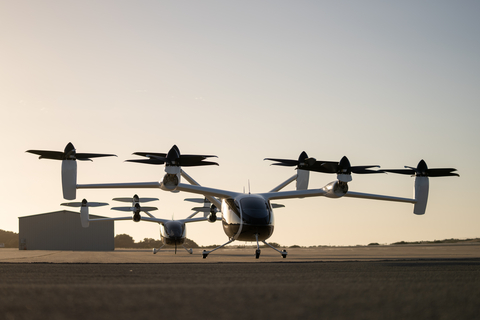Joby Widens USAF Partnership, Will Deliver Two eVTOL Aircraft to MacDill AFB
• Aircraft will be used by the
• Four Joby aircraft are now committed to

Two of Joby’s prototype electric air taxi aircraft at the company’s flight test and manufacturing facilities in
MacDill AFB is home to the
Joby delivered its first aircraft to Edwards Air Force Base in
Joby’s Agility Prime contract includes the provisioning of up to nine aircraft total to the
At MacDill AFB, Joby will be working directly with DoD operational units for the first time, enabling units to carry out representative logistics missions and test use cases in personnel transport, casualty evacuation, and support of security forces. Initial evaluations have demonstrated that the low maintenance requirements and operating costs, high speed, and low acoustic footprint of eVTOL aircraft like Joby’s can enable a diverse array of DoD use cases. Joby will continue to train USAF pilots and maintainers, and other government partners, on this new category of electric aircraft.
“The early investment and vision by the US government in this critical technology is proving foundational as we continue our path toward commercial passenger service. We’re grateful to our partners at the Department of Defense for their ongoing support and continued leadership in adopting eVTOL technology,” said JoeBen Bevirt, Founder and CEO of Joby. “We’re looking forward to working with units at MacDill Air Force Base as we further explore the potential use cases for our aircraft, demonstrating its capabilities in realistic settings.”
“This work will provide Joby with valuable early operational experience, while providing the USAF with firsthand understanding of the performance of our aircraft and its potential applications,” added Bevirt.
Joby’s electric air taxi is designed to carry a pilot and four passengers at speeds of up to 200 mph, offering high-speed mobility with a fraction of the noise produced by helicopters and zero operating emissions.
“The Agility Prime team is very excited to progress through a novel acquisition approach,” said Lt Col John Tekell, Agility Prime Branch Chief. “These two aircraft at MacDill AFB allow the program to take the next steps in learning to maximize the operational opportunity of eVTOLs.”
Joby’s longstanding partnership with the Department of Defense (DoD) dates back to its 2016 engagement with the Defense Innovation Unit (
Joby announced in February that it has completed the third of five stages of the type certification process required by the Federal Aviation Administration (FAA) for commercial service.
About Joby
Joby Aviation, Inc. (NYSE:JOBY) is a
About AFRL
The Air Force Research Laboratory is the primary scientific research and development center for the Department of the Air Force. AFRL plays an integral role in leading the discovery, development, and integration of affordable warfighting technologies for our air, space and cyberspace force. With a workforce of more than 12,500 across nine technology areas and 40 other operations across the globe, AFRL provides a diverse portfolio of science and technology ranging from fundamental to advanced research and technology development. For more information, visit www.afresearchlab.com.
About AFWERX
As the innovation arm of the DAF and a directorate within the Air Force Research Laboratory, AFWERX brings cutting-edge American ingenuity from small businesses and start-ups to address the most pressing challenges of the DAF. AFWERX employs approximately 370 military, civilian and contractor personnel at five hubs and sites executing an annual
Forward Looking Statements
This press release contains “forward-looking statements” within the meaning of the “safe harbor” provisions of the Private Securities Litigation Reform Act of 1995, including but not limited to, statements regarding the development and performance of our aircraft, the growth of our manufacturing capabilities, our regulatory outlook, progress and timing; our planned operations with the Department of Defense, including our plans to deliver two aircraft to MacDill Air Force Base in 2025, plans to deliver a second aircraft to Edwards Air Force Base in 2024 and the expected benefits of our work with the Department of Defense; our business plan, objectives, goals and market opportunity; and our current expectations relating to our business, financial condition, results of operations, prospects, capital needs and growth of our operations. You can identify forward-looking statements by the fact that they do not relate strictly to historical or current facts. These statements may include words such as “anticipate”, “estimate”, “expect”, “project”, “plan”, “intend”, “believe”, “may”, “will”, “should”, “can have”, “likely” and other words and terms of similar meaning in connection with any discussion of the timing or nature of future operating or financial performance or other events. All forward-looking statements are subject to risks and uncertainties that may cause actual results to differ materially, including: our ability to launch our aerial ridesharing service and the growth of the urban air mobility market generally; our ability to produce aircraft that meet our performance expectations in the volumes and on the timelines that we project, and our ability to launch our service; reliance on annual appropriations for continued funding of Department of Defense programs such as the Agility Prime Program; the competitive environment in which we operate; our future capital needs; our ability to adequately protect and enforce our intellectual property rights; our ability to effectively respond to evolving regulations and standards relating to our aircraft; our reliance on third-party suppliers and service partners; uncertainties related to our estimates of the size of the market for our service and future revenue opportunities; and other important factors discussed in the section titled “Risk Factors” in our Annual Report on Form 10-K, filed with the Securities and Exchange Commission (the “SEC”) on February 27, 2024, and in future filings and other reports we file with or furnish to the SEC. Any such forward-looking statements represent management’s estimates and beliefs as of the date of this presentation. While we may elect to update such forward-looking statements at some point in the future, we disclaim any obligation to do so, even if subsequent events cause our views to change.
View source version on businesswire.com: https://www.businesswire.com/news/home/20240319826734/en/
Joby Aviation
Investors:
investors@jobyaviation.com
Media:
press@jobyaviation.com
Source: Joby Aviation, Inc.








